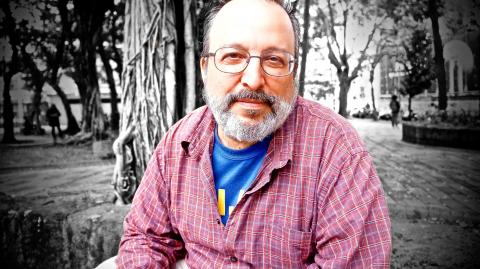We’re getting on well. Nice lunch, a little oolong tea, bright conversation. We stroll over to the nearby park to continue our talk, watch the world go by and find we have a lot in common. He’s charming, well informed and trots out a succession of witty one-liners. Then we take a couple of photos and it’s time to say goodbye. He politely asks to see the interview before it’s published, I say I can’t do that. And the mood suddenly changes.
He says if he can’t see the article first, then I can’t run it. We compromise by my agreeing to check the quotes with him for accuracy.
I was a bit disappointed, but Michael Turton — the well known blogger, Democratic Progressive Party (DPP) and Taiwan independence supporter, science fiction writer, keen cyclist, devoted dad and foodie — is made of sterner stuff.

Photo: Jules Quartly
The 52-year-old has lived in Taiwan for more than 20 years, but originally hails from a coal mining town in Pennsylvania. It’s Confederate flag territory and if you’ve seen The Deer Hunter, you get the idea.
POLITICAL COMEUPPANCE
Like many long-term expats he’s not necessarily kind about the land of his birth. Asked whether the US is going to be great again, or is great already, he says: “Since [Ronald] Reagan it’s been an obvious train wreck and it’s only got worse over the last 30 years … [Donald] Trump is a horror story, an extremely powerful buffoon. Hillary [Clinton] is a disaster too, she’s basically a Wall Street puppet.”
He calls Trump the “Great American id run wild” and “a sign of system failure.” He doesn’t believe Trump will get the Republican nomination.
“He’s just the first and not the last, and in the future they’re going to be cleverer and won’t be so bombastic, or refer to their male dangly ornamentation,” he warns.
When he boils it down he sounds a bit Marxist. In a good way.
“The Republicans are going to get all the racist crap they’ve been cultivating for the last 40 years come home to them and it’s going to blow them apart,” he says. “It’s always been an uneasy alliance between wealthy elites screwing the white working class and cemented by shared racism. It’s the way the South works. It’s the Confederacy in charge of the Republican party.”
All this comes out at pace. Turton just turns on the tap and it pours out. He then worries that he’s said too much. I imagine him writing (his blog “The View from Taiwan” has been running since 2005, michaelturton.blogspot.com) in a stream-of-consciousness style. He then forces himself to leave it to the next day, before doing a heavy edit, taking out the incendiary material, and only then hitting send.
As I understand it, he ought to be fairly accommodating to Republicans because they generally support full-on sovereignty for Taiwan; a decisive break with China and Taiwan lining up with the US militarily in the war that will “inevitably come” with the communists. A mostly naval, limited war, he believes.
Democrats, on the other hand, would rather accommodate China and are therefore more prone to give concessions over Taiwan, maintain the status quo and keep the money rolling in with its major trading partner.
I say he sounds pessimistic, and admit to cynicism myself. In response, he wheels out the Stephen Colbert line: “Cynicism masquerades as wisdom.”
SWEET HOME TAICHUNG
A former Peace Corps volunteer in Kenya, Turton ended up in Taiwan by accident, following a friend, having nothing better to do. He characterizes the country as the “Island of the Lotus Eaters,” an Earthly paradise that you can never leave. It’s from Homer’s Odyssey, one of his favorite books.
He’s settled in Taichung, because the weather’s good and it’s like Taipei 20 years ago. “Same feeling, same gangsters,” he jokes.
When we meet he’s in a bright mood because the week’s work is done, teaching English part-time at Chang Gung University of Science and Technology in Taipei. The sun has poked its head out after hiding for a month and Taiwan has turned a deep shade of green, politically speaking, with the election of Tsai Ing-wen (蔡英文) as president. He’s in triumphalist mode.
I get the feeling that as much as he enjoyed the DPP victory, he revels in the Chinese Nationalist Party’s (KMT) collapse even more. He underlines this by saying, “The DPP didn’t win, the KMT lost because they were incompetent.”
Though he calls the KMT a “tumor you can’t cut out,” he adds the party is “doomed” and spells out why in a recent blog.
First the KMT is aging; there’s no real career path for thrusting KMT politicians; young people identify as Taiwanese and the KMT has never really represented Taiwan; its control of local factions (temples and gangsters) is weakening, as are the factions themselves; demographics have changed; its losing the money that made it powerful; and finally, it’s not actually a political party but rather “the political organization of a colonial ruling class.”
I tell him all I see is the same two established parties in the future, much the same as other democracies, fighting over power, in and out of the revolving election door. I offer a bet, but he doesn’t take it. He even backtracks a little by saying the only way the KMT can survive is by Taiwanizing. Then, he repeats the points above and assures me if there are two parties in the future, they’re more likely to be the result of a fissure in the DPP.
“The DPP is split in respect of economics and class, there’s the pro-business camp and the poor people,” he says.
Importantly, Turton doesn’t see much argument within the DPP about Taiwan identity. Some commentators play up the differences between “Taiwan independence (台獨, taidu) and “Republic of China independence” (華獨, huadu) supporters, with the former basically wanting to get rid of the ROC regime entirely, and the latter accepting the status quo.
But Turton called it a long time ago.
“This is the post-independence generation. Everyone is Taiwanese. Huadu, Taidu, we’re past all that, everyone knows we’re past that now.”
You can forgive him for feeling vindicated.
“It was only this election that people in the mainstream media used the term ‘pro-Taiwan’ rather than ‘anti-China.’ It was a pivotal moment. It’s something I’ve been saying for 11 years. It was like a flower turning to the new sun.”
He’s also optimistic about Taiwan, especially now we’ve got rid of President Ma Ying-jeou (馬英九) and his fire sale of the economy to the highest Chinese bidder. The country is upgrading as we speak. While he admits it doesn’t look that good right now, with wages having near-frozen over the past decade, he expects it to “tick up a bit. I’m really looking forward to the future.”
For someone who is criticized for being such a dyed-in-the-wool DPP “apologist,” Turton is surprisingly free-thinking and wide ranging. A bit anarchic — the shock jock of Taiwan politics.
He also wins by being able to laugh at himself and has a neat line in self-deprecation. For instance, he says of his political writing. “I’m a very particular kind of parasite. Without the people providing information, I wouldn’t have anything to comment on.”
And for the record, Turton didn’t object to anything attributed to him, except for a second sentence in the Colbert quote about cynicism, because he didn’t say it and “it makes me look smarter than I am to use that.”
1 0H 1: Can refer to Taipei 101; an introductory course or analysis; One uh One, a spare male at a party, or a useless person — always male; there are about 1.01 men for every 1 woman, thus, every one hundred and first male is not going to find a partner; a one-on-one interview.

Last week the State Department made several small changes to its Web information on Taiwan. First, it removed a statement saying that the US “does not support Taiwan independence.” The current statement now reads: “We oppose any unilateral changes to the status quo from either side. We expect cross-strait differences to be resolved by peaceful means, free from coercion, in a manner acceptable to the people on both sides of the Strait.” In 2022 the administration of Joe Biden also removed that verbiage, but after a month of pressure from the People’s Republic of China (PRC), reinstated it. The American

Chinese Nationalist Party (KMT) legislative caucus convener Fu Kun-chi (傅?萁) and some in the deep blue camp seem determined to ensure many of the recall campaigns against their lawmakers succeed. Widely known as the “King of Hualien,” Fu also appears to have become the king of the KMT. In theory, Legislative Speaker Han Kuo-yu (韓國瑜) outranks him, but Han is supposed to be even-handed in negotiations between party caucuses — the Democratic Progressive Party (DPP) says he is not — and Fu has been outright ignoring Han. Party Chairman Eric Chu (朱立倫) isn’t taking the lead on anything while Fu

There is a Chinese Communist Party (CCP) plot to put millions at the mercy of the CCP using just released AI technology. This isn’t being overly dramatic. The speed at which AI is improving is exponential as AI improves itself, and we are unprepared for this because we have never experienced anything like this before. For example, a few months ago music videos made on home computers began appearing with AI-generated people and scenes in them that were pretty impressive, but the people would sprout extra arms and fingers, food would inexplicably fly off plates into mouths and text on

Feb 24 to March 2 It’s said that the entire nation came to a standstill every time The Scholar Swordsman (雲州大儒俠) appeared on television. Children skipped school, farmers left the fields and workers went home to watch their hero Shih Yen-wen (史艷文) rid the world of evil in the 30-minute daily glove puppetry show. Even those who didn’t speak Hoklo (commonly known as Taiwanese) were hooked. Running from March 2, 1970 until the government banned it in 1974, the show made Shih a household name and breathed new life into the faltering traditional puppetry industry. It wasn’t the first